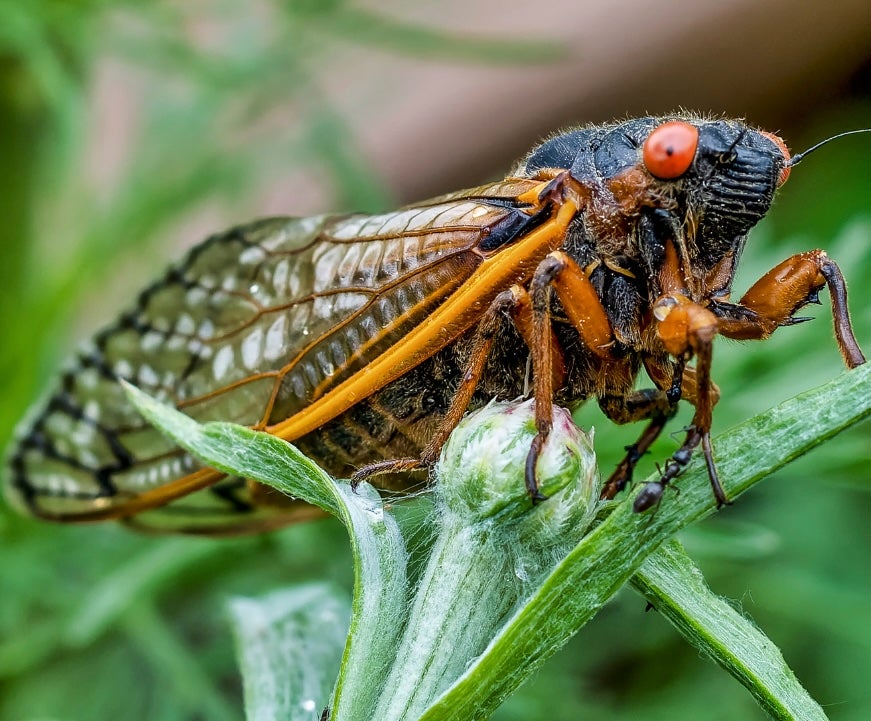CALL YOUR TRUSTED LOCAL EXPERTSSM
Cicadas and Your Air Conditioner
Protecting Your AC Unit from 2024’s Cicada Invasion
The 2024 cicada season will be one of the worst ever experienced in Chicago’s long history. According to the University of Illinois, the emergence of these two broods hasn’t happened since 1803 and won’t happen again until 2245.

As the cicada season approaches, homeowners in affected areas should be aware of these insects’ potential impacts on air conditioning systems. While cicadas are known for their loud mating calls and remarkable emergency patterns, their presence can also lead to unexpected and significant issues with household AC units, affecting everything from system efficiency to overall home comfort. Understanding the way these insects can interfere with your AC system will help you prepare for potential problems. Homeowners must recognize the signs and take preventative steps to ensure that their air conditioning systems continue to function optimally throughout the warmer months.
How Cicadas Affect Your Home’s AC System
Understanding how cicadas can influence these systems’ functionality and efficiency is crucial for maintaining a comfortable and cost-effective home environment during the warm months. Cicadas can pose significant challenges to residential cooling systems. Recognizing the key issues that cicadas can cause is the first step toward implementing effective preventive measures. Here are a few primary issues that homeowners might face with their air conditioning systems due to cicadas:
- Clogging Air Vents and Filters — Cicadas can enter outdoor air conditioning units, where their bodies can clog vents and filters. This restricts airflow, forcing the AC unit to work harder to circulate air, which can reduce efficiency and increase wear and tear.
- Damaging Components—The presence of cicadas inside the AC units can lead to physical damage. They may block moving parts such as fans or interfere with electrical components, causing potential short circuits or other mechanical failures. So if you are wondering why your AC compressor and fan are not running, it might be because of cicadas.
- Reducing Heat Exchange Efficiency — Cicadas can accumulate around the condenser coils, which are crucial for dissipating heat. Their presence can insulate these coils, reducing the AC unit’s ability to expel heat and impairing its overall cooling efficiency.
- Increasing Maintenance Needs—With Cicadas infiltrating AC systems, homeowners might need frequent maintenance checks and cleaning to ensure their systems are running correctly. Cicadas entering your AC system can lead to damages and increased service costs.
- Potential for Full System Breakdowns — In severe cases, the accumulation of cicadas and the resulting strain on the AC system can lead to complete breakdowns, necessitating costly repairs or even unit replacement.
- Attracting Predators — Cicadas in the AC units can also attract predators such as birds or small mammals, which might further damage the exterior parts of the AC system as they attempt to reach the cicadas.
The invasion of cicadas can pose unexpected challenges to air conditioning systems. By understanding and addressing these potential problems early, you can ensure that your AC system remains effective and efficient throughout the cicada season, keeping your home comfortable without unexpected expenses.
How Do I Get Rid of Cicadas in My Air Conditioner?
Wondering how do you get rid of cicadas in your air conditioner? Cicadas can cause significant damage, leading to decreased efficiency and potentially costly repairs. Here are some steps that prevent cicadas from entering your system and help maintain its optimal functioning during the warmer months.
- Regular Maintenance Check — Schedule regular inspections and maintenance for your AC system, especially during or just before the cicada season. Ensure that all parts are functioning correctly and that there is nowhere cicadas could enter.
- Clear Vegetation — Keep the area around your AC unit clear of excessive vegetation. Overgrown bushes or high grass can harbor cicadas and other insects, increasing their likelihood of them entering your system.
- Seal Gaps and Cracks — Check the seals around your AC unit and in your home’s foundation.l any gaps or cracks with appropriate caulking or foam to prevent cicadas from entering through these small spaces.
- Monitor and Remove — Inspect your outdoor AC unit for any signs of cicadas or other debris. Remove any insects or nests promptly to prevent accumulation. Checking your AC unit regularly helps maintain the efficiency of your air conditioning system, reducing the risk of damage.
Implementing these steps can protect your air conditioning unit from the onslaught of cicadas. Regular maintenance and proactive measures are key to preventing infestations and ensuring your system runs smoothly throughout the seas. This will ensure it remains efficient and reduces the need for costly repairs.
Contact Four Seasons Heating and Cooling For More Information
Don’t let the upcoming cicada invasion of Chicagoland put a strain on your air conditioning and your wallet. At Four Seasons Heating and Cooling, we understand the unique challenges cicadas can bring. Protect your air conditioning system with our expert services. Trust Four Seasons to defend your AC against cicadas. Ensure your home remains cool and efficient by scheduling an appointment with us today. Your comfort is our priority, and we’re here to ensure it’s safeguarded throughout the cicada season and beyond.
Contact us to schedule your Chicago AC tune up today.


